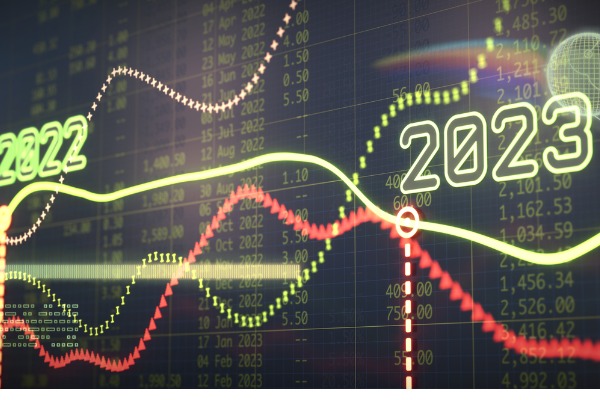How fund manager predictions fared in 2022, and what’s forecast for 2023
28th December 2022 09:59
by Sam Benstead from interactive investor
Sam Benstead holds 2022 forecasts to account, and reveals what could happen in markets next year.

It’s the time of the year when investment management firms release their outlooks for stock markets over the next 12 months – but how useful are they really when making investment decisions and did last year’s biggest calls turn out to be correct?
- Invest with ii: Top ISA Funds | FTSE Tracker Funds | Open a Stocks & Shares ISA
Invesco
This time last year, fund manager Invesco said inflation would peak in mid-2022, cooling gradually into 2023, with central banks tightening interest rates. So far, so good.
However, under this, its “base case”, it said equities, property and commodities were relatively attractive, with large stocks, utilities, technology, consumer staples and healthcare some of the best sectors.
This did not play out quite as Invesco expected. While consumer staples, utilities and healthcare have had a relatively strong year, property and tech shares have suffered due to higher interest rates. Stocks in general have offered little protection against inflation and a shaky economy. Commodities have been the standout sector, with higher oil and mineral prices increasing profits at oil and mining companies.
- Visit our YouTube channel to view our experts’ tips for 2023
- The biggest stock market surprises of 2022 for fund investors
- The 20 best and worst-performing funds of 2022
Under persistent inflation, Invesco backed gold, inflation-protected bonds and government bonds.
These areas made poor investments this year, with gold flat for the year, and inflation-linked bonds and government bonds suffering due to rapid rises in interest rates.
Morgan Stanley
Morgan Stanley’s chief investment officer for wealth management Lisa Shalett said last year that near-record higher earnings multiples of the S&P 500 was a warning sign and investors would not simply be able to rely on owning index funds packed with the largest and most expensive companies.
“The economic and market environment in 2022 will be decidedly reflationary, with higher economic growth and higher inflation, and eventually higher real interest rates - in short, a hotter and shorter business cycle,” she said.
Shalett predicted that key to beating the market in 2022 would be more balanced portfolios, with US shares outperforming the rest of the world, growth stocks beating value stocks, and cyclical shares beating defensive shares.
“Investors may want to reduce traditional fixed-income allocations and increase exposure to real assets and absolute-return hedge funds,” she added.
So did active funds beat passive funds in 2022? The answer is a resounding no. In the UK, the typical FTSE All-Share active fund returned –10.5%, while the FTSE All-Share index lost 1%. In the US, stock pickers returned –11%, while the S&P 500 lost –10.5%, and globally the MSCI World index fell 9%, while the typical global fund fell 12.5%.
Shalett was wrong that US shares would outperform global shares, and also wrong that growth stocks and cyclical stocks would beat value stocks and defensive stocks.
AXA Investment Mangers
AXA Investment Managers chief investment officer Chris Iggo said rising inflation would be a concern in 2022 and predicted that interest rate rises having a big impact on investment returns.
However, he said monetary policy tightening was broadly priced in at the start of the year, and bond losses would “not be too significant”.
“Equally, equity markets should be able to cope with modestly higher rates so long as corporate earnings keep growing. However, the strong corporate earnings experienced in 2021 look set to recede in 2022 as economic activity normalises,” he added.
- The most-popular passive funds and ETFs of 2022
- These two regions are tipped as winners in 2023. Here’s how to profit
This turned out to be wrong, with central banks ramping up rate rises against initial expectations, which hurt bond and stock prices.
The typical sterling corporate bond fund lost 16% this year, while actively managed gilt portfolios lost 23% on average and index-linked gilt portfolios, which have longer maturity dates and so are more sensitive to interest rate changes, lost 35%.
However, Iggo did make the correct call in saying that the biggest risk to investors is that inflation forces a more aggressive policy response from central banks.
“That could mean higher bond yields and wider credit and equity risk premiums.”
He was positive on equities, neutral on investment grade bonds, negative on government bonds, and negative on commodities.

What will happen in 2023?
Given that we now know that outlooks should be taken with a pinch of salt, what are the pros predicting will happen to the economy and markets in 2023?
LGIM
Legal & General Investment Management's (LGIM) head of investment strategy and research Ben Bennett is negative on equities next year because profits will fall amid tough macroeconomic conditions
“With labour costs rising, even a mild recession should lead to a sharp fall in profits. And if we see a 20-25% decline in S&P 500 profits, then past relationships suggest the index could also fall by 20%,” he said.
- The asset class tipped to lead the charts in 2023
- What are the cheapest ETFs to track global markets?
He reckons once the S&P 500 reaches 3,000 points, 21% below its end of December level, all the bad news will be priced in and he could begin increasing stock market exposure again.
LGIM’s chief investment officer Sonja Laud adds that bonds should do well next year, especially given the greater income they now offer investors, and clean energy and cybersecurity could be winning equity themes in 2023, as well as Japanese stocks.
Laud said: “We fear that 2023 will be another difficult year for equity markets and harbour particular concerns about the most cyclically exposed sectors. Regionally, Japan is our preferred market, given the desynchronised nature of its recovery. At the sectoral level, we think tech stocks are set to recover, with their earnings likely to prove more resilient in a global downturn. In terms of thematic plays, we believe decarbonisation will remain the most important secular theme.”
Morgan Stanley
Emerging market and Japanese shares are investment bank Morgan Stanley’s top stock market picks for 2023, with the investment analyst also saying that US stocks will continue to lag international peers.
“Valuations are clearly cheap and cyclical winds are shifting in favour of emerging markets as global inflation eases quicker than expected, the US Federal Reserve stops hiking in January (and starts cutting in at the end of next year), and the US dollar weakens.
- Benstead on Bonds: is there a gilt crash coming in 2023?
- Watch our video: Sam Benstead's high-yield bond market tip for 2023
- Bond Watch: inflation down, interest rates up
“The MSCI Emerging Market index typically outperforms in early cycle, and we see 12% price returns in 2023,” the bank said.
Vanguard
Vanguard says that global inflation will be “persistently surprising”, as the war in Ukraine continues, threatening another surge in energy and food commodities prices, and supply-demand imbalances linger in many sectors as global supply chains have yet to fully recover from the Covid-19.
This is not a good backdrop for equities, but the steep stock market sell-off this year is a silver lining, the fund manager argues.
The fund giant expects 10-year annualised returns for non-US developed markets of 7.2%–9.2% and emerging market returns of between 7% and 9%, with US shares returning between 4.7% and 6.7% annually for the next decade.
Vanguard is also backing bonds to return to favour next year, with gains between 4.1% and 5.1% annualised for the next decade, compared with the 1.4%–2.4% annual returns forecast a year ago.
AXA Investment Managers
Iggo says 2023 could be a better year for equities, given that valuations have becoming more reasonable compared with a year ago.
He said: “A year ago, markets were at higher valuations, rate hikes had not started. Inflation was only modestly moving higher and there was no Ukraine crisis. A lot of bad things have happened to send equity markets down. The lows of early this year could be tested but I suspect that a buy-on-dips mentality might start to prevail.”
- Most-popular fund and investment trust articles of 2022
- The best and worst-performing investment trusts of 2022
He says that a peak in inflation, a plateauing of interest rates and China re-opening could send equities higher in 2023.
Iggo also likes bonds, arguing that short-maturity corporate bonds could perform well, as well as high yield.
He said: “High-yield companies, overall, also look attractive from a bond perspective. Yields are high, prices are low and default risk is more limited than in previous cyclical downturns.”
Invesco
Once again, Invesco says there are opportunities in the stock market in the new year. Emerging market and Asian stocks are one of its biggest tips for 2023 because they are insulated from many of the economic challenges the West is facing.
William Lam, co-head of Asian and emerging market equities, said: “Domestic macroeconomic conditions in Asia should continue to remain largely stable in 2023, with inflation at more comfortable levels than in the US and Europe. Many countries in the region are at an earlier stage in their economic cycle, with rising incomes and consumer penetration a tailwind to structural demand.”
Invesco also likes UK shares, stating they offer “significant value”. Key beneficiaries will likely include high-quality, cash generative businesses, it said.
Martin Walker, head of UK equities, adds: “If, as we expect, credibility in the UK government begins to emerge, equity investors will refocus their attention on what really matters – company fundamentals and cash flows. While we understand that sentiment on UK domestic issues has been a drag on market performance since the summer, investors should appreciate that UK corporate earnings are not a proxy for the UK economy. Only around 25% of the revenues are derived from the UK’s GDP. The rest are international.”
These articles are provided for information purposes only. Occasionally, an opinion about whether to buy or sell a specific investment may be provided by third parties. The content is not intended to be a personal recommendation to buy or sell any financial instrument or product, or to adopt any investment strategy as it is not provided based on an assessment of your investing knowledge and experience, your financial situation or your investment objectives. The value of your investments, and the income derived from them, may go down as well as up. You may not get back all the money that you invest. The investments referred to in this article may not be suitable for all investors, and if in doubt, an investor should seek advice from a qualified investment adviser.
Full performance can be found on the company or index summary page on the interactive investor website. Simply click on the company's or index name highlighted in the article.